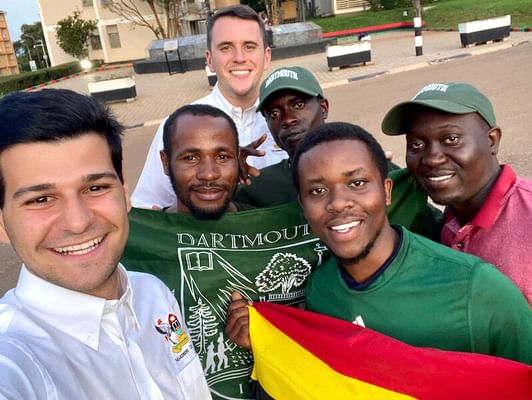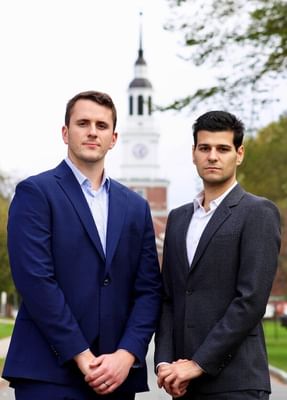- Undergraduate
Bachelor's Degrees
Bachelor of ArtsBachelor of EngineeringDual-Degree ProgramUndergraduate AdmissionsUndergraduate Experience
- Graduate
Graduate Experience
- Research
- Entrepreneurship
- Community
- About
-
Search
All Thayer News


Dartmouth Graduate Students Turn African Agricultural Waste into Entrepreneurial Opportunity
Jan 30, 2024 | by Catha Mayor
Master of Arts in Liberal Studies (MALS) candidate Baptiste Gibrat didn't expect to become a student entrepreneur until he met engineering PhD candidate Michael May Th'22. Their collaboration began last spring in a technoeconomic analysis class along with four Ugandan students. A compelling class project led to a trip to Africa and the two are now co-founders of NET Offset, a startup aimed at addressing food insecurity by converting local agricultural waste into an affordable, high-quality organic fertilizer that also sequesters carbon.

The NET Offset team: Baptiste Gibrat, Michael May Th'22, and graduate special students Ashirafu Miiro, Oscar Ogala, Raymond Namusoso, and Richard Katongole.
The waste would first be turned into biochar—a charcoal-like substance made from biomass—and then be refined into fertilizer. "NET Offset's model transforms crop residues into a biochar-based fertilizer to accomplish two key goals," said May. "One is enhancing soil quality to boost crop yields in low-income areas, and two is mitigating climate change through carbon sequestration."
"In East Africa, there is a serious shortage of fertilizer," added Gibrat whose MALS concentration is in globalization studies. "What little there is, is mostly imported and costly and not very effective. We want to offer a locally-produced fertilizer that's both affordable and effective with the added bonus of helping to remove carbon from the atmosphere."
Recently, NET Offset was accepted into the inaugural cohort of the "Greenshot" program that started this month—a 14-week accelerator for climate entrepreneurs run by Dartmouth's Irving Institute for Energy and Society and Magnuson Center for Entrepreneurship. "This opportunity will aid us in deploying our first biochar facility in Uganda and scaling our operations to include more commercial partnerships across East Africa," said May.
The company's advisory board includes Dartmouth Engineering professors Mark Laser and Lee Lynd, as well as Mukul Sharma, Professor of Earth Sciences, and Julius Ecuru, Principal Scientist and Manager at BioInnovate Africa of the International Centre of Insect Physiology and Ecology (icipe), providing training in technoeconomic analysis of innovation projects.
Dartmouth is currently entering its fourth year of collaboration with BioInnovate Africa, co-led by Laser and Lynd, for which students from East Africa take an online two-course sequence, "Chemical Process Design" and "Technoeconomic Analysis in a Developing Country Context," alongside Dartmouth students.

NET Offset co-founders Michael May Th'22 and Baptiste Gibrat. (Photo by Isaiah Richardson)
"I focused my MALS degree on the economics of developing countries, so that was the perfect course for me, and that's where I met Mike," said Gibrat. "When we first started working on this, we realized Uganda has a significant amount of agricultural waste that could potentially be converted into biofuels. So, we went there and found there is actually much more waste than we could have ever imagined. However, we also determined that it is too early to deploy the needed biofuels technology. So we thought, 'Okay, let's come up with a solution for this waste.'"
That's when Professor Laser planted the seed. "He said to us, 'Well, maybe biofuels isn't the answer right now, but what about biochar?' And that's what got us thinking about what we have today," said May. "The cool thing about Dartmouth is you get a lot of unexpected opportunities that can give you the impetus to change course."
"I wanted to work on a project in Uganda because one of my closest friends is a Dartmouth student from Kampala, Uganda," continued May. "It turns out we had many Ugandan students interested in the project. We all shared an interest in the country and in sustainable development, and it allowed Baptiste to use his economic skills as well."
May works on energy systems modeling in professor Erin Mayfield's Sustainable Transitions Lab and found the project to be a natural offshoot of his research. "The soils in Uganda are quite nutrient poor. Biochar-based fertilizers are good not only for adding additional carbon, nitrogen, and phosphorus, but also for returning soil pH to healthy levels and increasing water retention. If you do it sustainably and in the right way, it has a very positive effect. This requires carefully planning out a system including the supply chain, transportation, and other network considerations. We're planning to partner with commercial farms to create the co-benefits of a high-value soil amendment that has strong societal impact."
NET Offset is well-served by the combination of May's technical knowledge with Gibrat's economic prowess. "This fertilizer, because it's sequestered carbon, can be monetized on the voluntary carbon market for companies trying to achieve their net-zero targets," said Gibrat. "They buy tons of removed CO2 to offset their emissions. We're lucky that market provides a hedge against risk and finances part of the system."
The two also want to keep their doors open to other interested students as they go. "We're working with Professor Laser to involve the next batch of students in his course," said Gibrat. "And we're staying in touch with our advisor, Julius, who told us he has many brilliant students willing to work with us."
"An advantage of formulating a startup at Dartmouth is how students get exposure to different companies," added May. "In the 89/90 courses, students actually get to work on a company-level project over an extended period of time. That's something we're going to formulate into our business plan—ongoing collaborations with students interested in human-centered engineering that has real societal impact. We've also been in contact with Dartmouth alumni who've been instrumental in guiding us along the process. So we have a lot of support from Dartmouth in many different ways."
May earned his MS in engineering sciences at Dartmouth and has been inspired by the holistic approach to problem solving. "What originally drew me to Dartmouth was the interdisciplinary nature of the program, but human-centered design and human-centered engineering came into play as I began learning how energy systems affect communities and what equity is within the energy transition. If you're trying to solve a problem only from the technical engineering perspective, you're not going to capture what's necessary to help the community. You have to account for their specific needs and cater to their requirements within the context in which they live—which is why a lot of this revolves around interacting with the community."
Gibrat agrees. "During our first trip, we gained a clear understanding of the problem. We saw that the key challenge was not only technological, but also deeply rooted in the socio-economic fabric of the country. This realization underscored the critical need for solutions that not only address the immediate issue but also offer multiple, shareable benefits. In March, I will be returning to Uganda to generate more stakeholder engagement, with a continual focus on how we can maximize our impact. The project is particularly exciting because it aligns with so many United Nations Sustainable Development Goals, and we're confident that we'll see tangible societal and climate results within just a few years."
November 2024 update: The NET Offset team received a grant from the National Science Foundation, an independent agency of the United States federal government, to explore the application of their research in the US. They have decided to pause their activities in Uganda to pursue this opportunity.
For contacts and other media information visit our Media Resources page.
